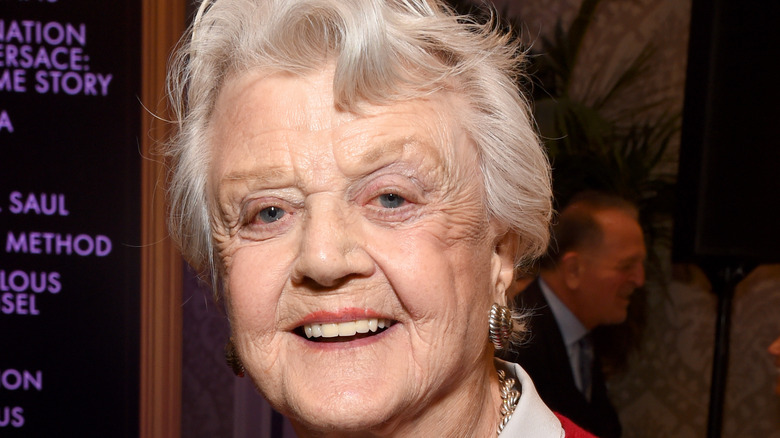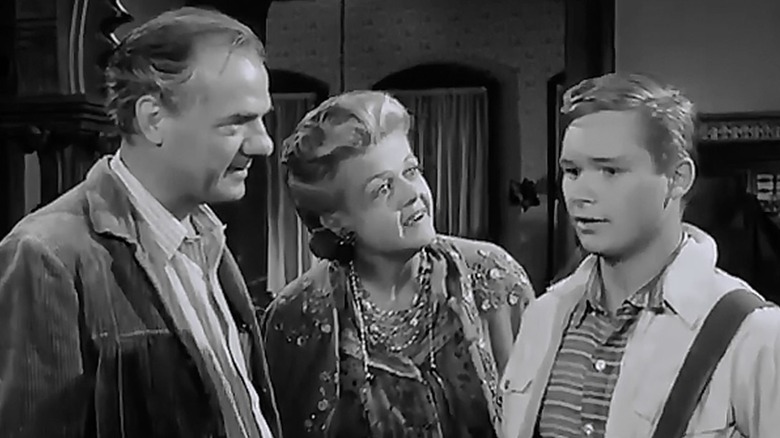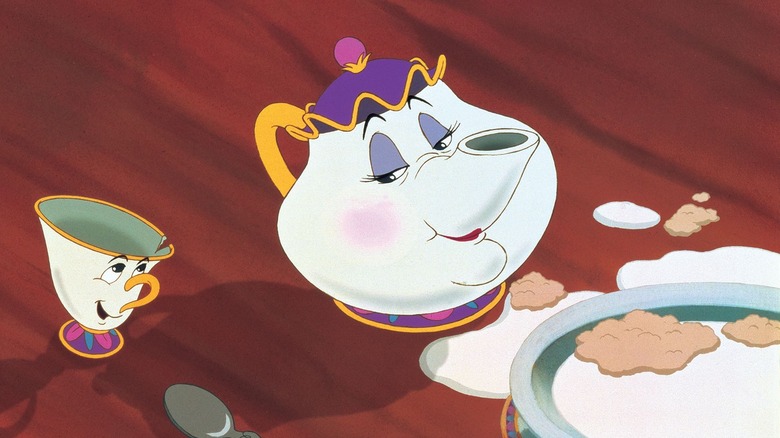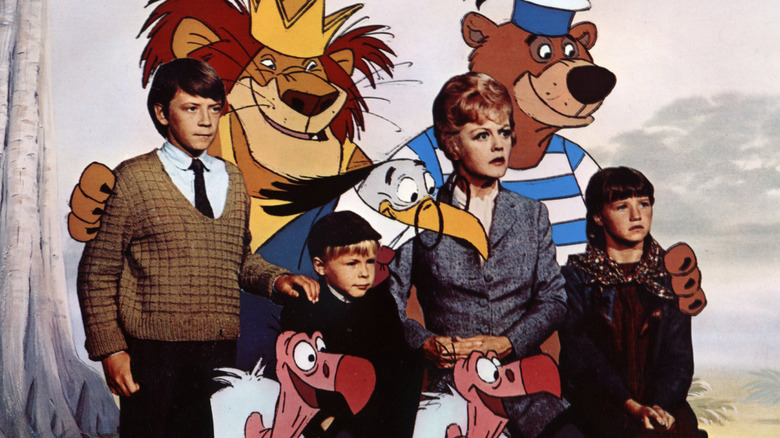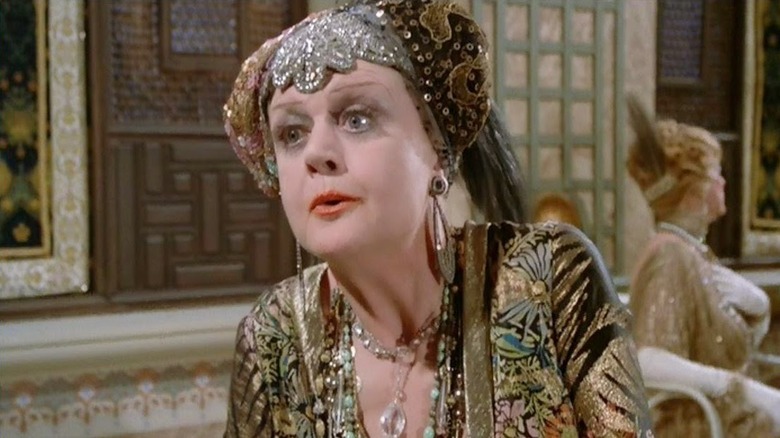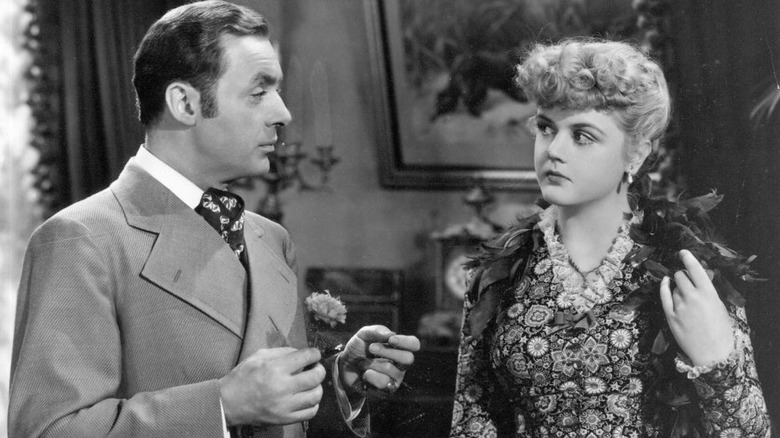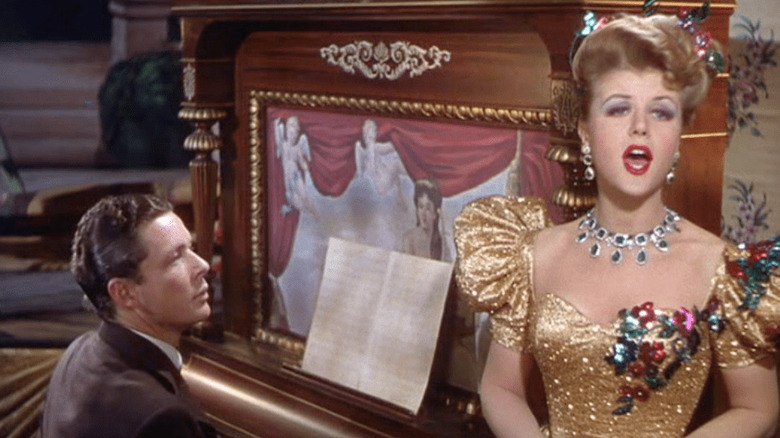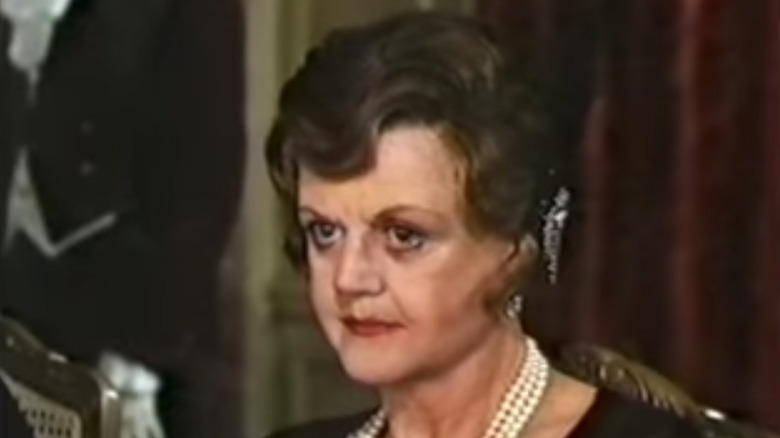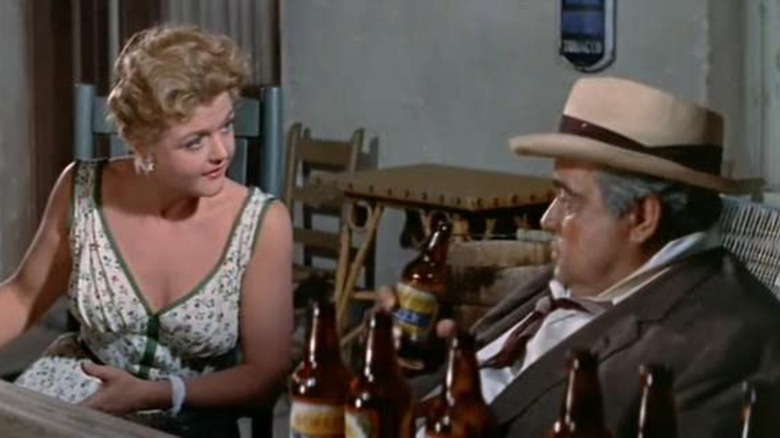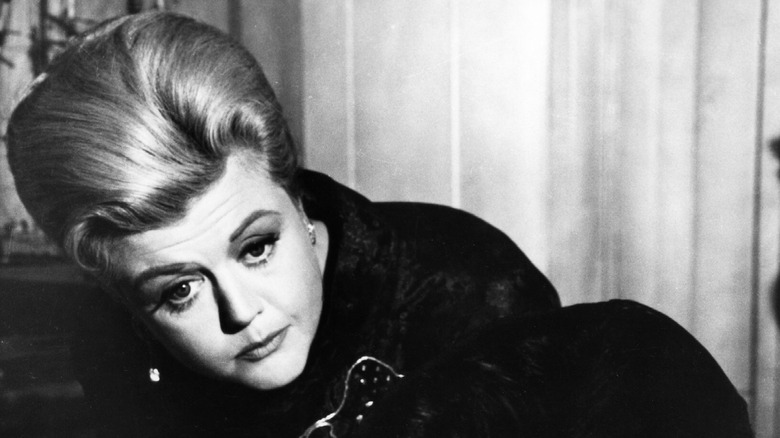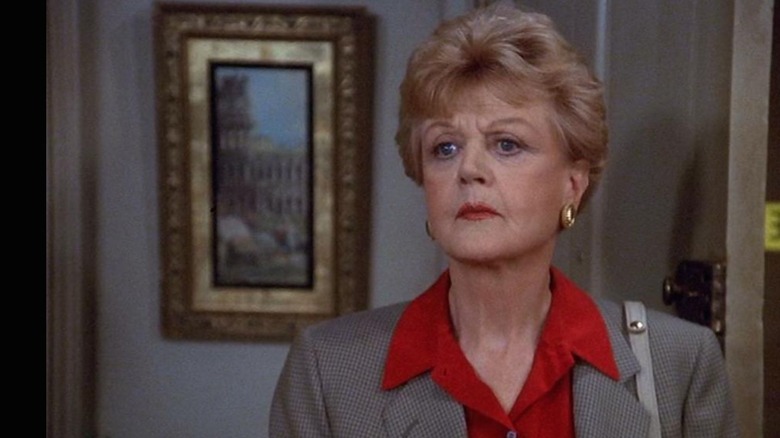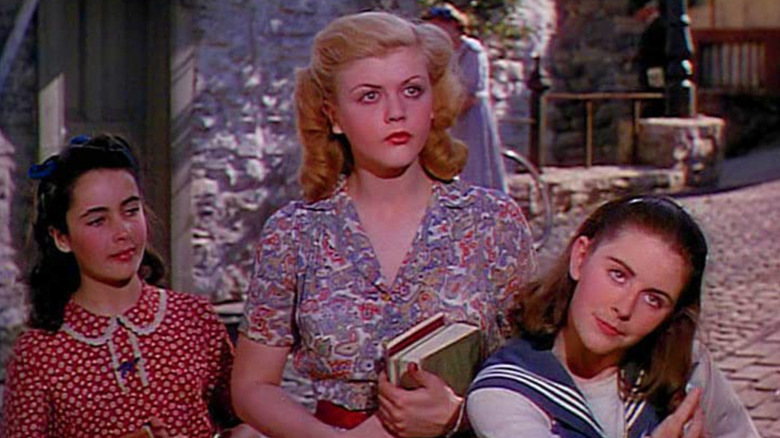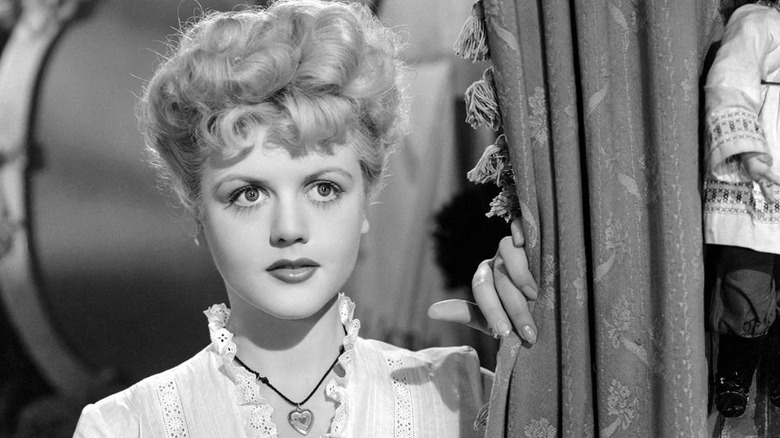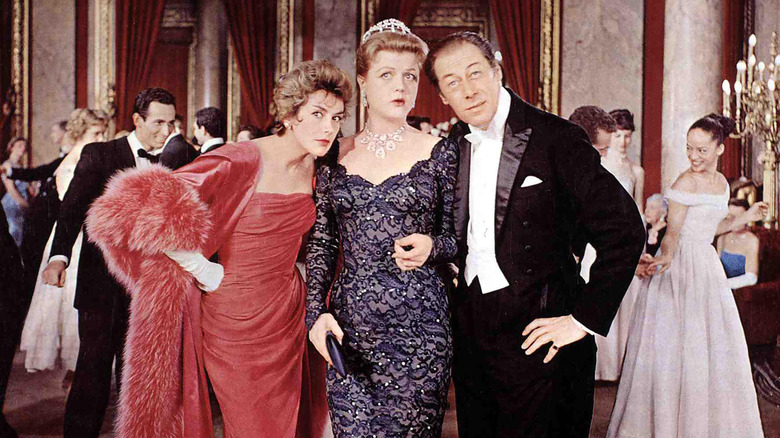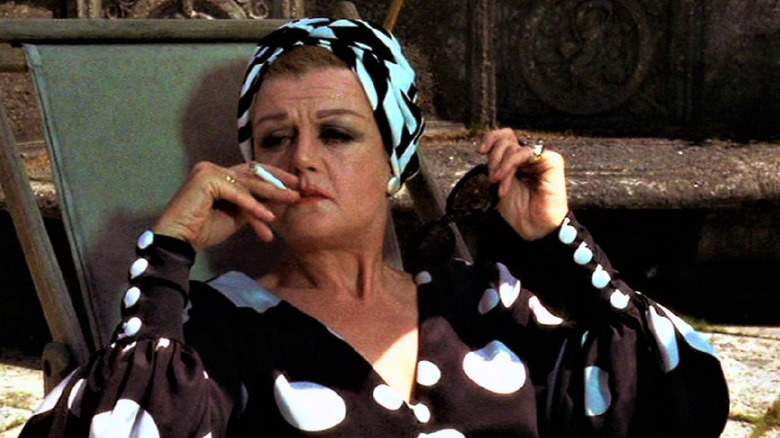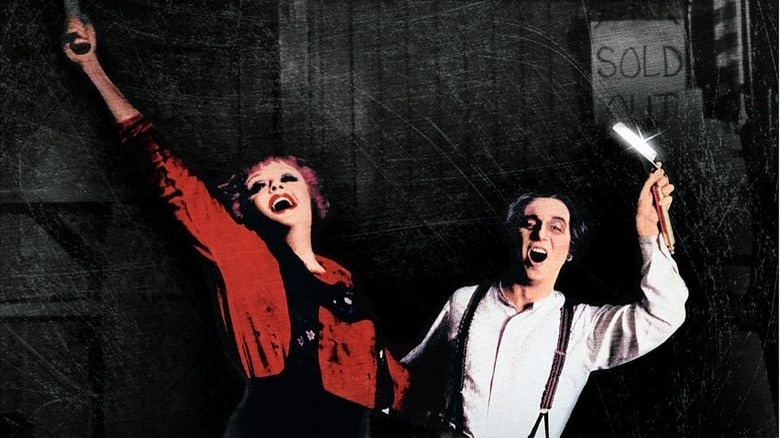Angela Lansbury's Best Movie And TV Roles
Dame Angela Lansbury has been a beloved presence in film, television, and theater for nearly eight decades. Although she's best known as a benevolent, grandmotherly figure in many modern children's movies and musicals, that doesn't begin to encapsulate her range as an actress. Take a tour through her stage and screen credits and you'll be surprised to find how many times she's played villains, seductresses, and schemers.
Lansbury got her start in movies when she was just 19-years-old, playing a conniving maid in "Gaslight" (1944), for which she earned her first of three Oscar nominations as Best Supporting Actress. She competed again the very next year, having starred as the tragic love interest in "The Picture of Dorian Gray" (1945). A third Oscar bid followed for her chilling, iconic performance as the manipulative mother in "The Manchurian Candidate" (1962). Although she has never won a competitive prize, she was awarded an honorary Oscar in 2013.
Perhaps best remembered for playing mystery writer/amateur sleuth Jessica Fletcher on "Murder, She Wrote," a top-rated series that inspired a hugely loyal following and ran for 12 seasons on CBS, Lansbury's work on the show is still quite popular, inspiring memes and other internet culture — along with a theory she was the murderer all along. Lansbury earned 12 out of her 18 career Emmy nominations for the show, plus four Golden Globe wins (out of 10 nominations). She reprised the role in four TV movies after the series ended in 1996.
Younger fans got to know Lansbury as the voice of Mrs. Potts in Disney's animated classic "Beauty and the Beast" (1991), 2005's "Nanny McPhee" and the 2011 Jim Carrey children's film "Mr. Popper's Penguins." Broadway aficionados know her best for her stage work, which includes Tony victories for "Mame" (1966), "Dear World" (1969), "Gypsy" (1975), "Sweeney Todd: The Demon Barber of Fleet Street" (1979), and "Blithe Spirit" (2009). Either way, appreciation for Lansbury's musical theater skills is multi-generational.
So whether it's at age 19 or 90, Lansbury has always excelled, on both stage and screen. Here's a look back at some of Angela Lansbury's best movie and television roles.
All Fall Down (1962)
The same year she earned an Oscar nomination for playing the conniving mother in John Frankenheimer's "The Manchurian Candidate," Lansbury played another manipulative momma in the director's "All Fall Down" (which was actually Frankenheimer's third film released in 1962, along with another classic, "Birdman of Alcatraz").
Adapted by William Inge from James Leo Herlihy's novel, it's the story of a hedonistic drifter (Warren Beatty) who leeches off the women he romances. His constantly disappointed parents (Lansbury and Karl Malden) are shocked when he shacks up with an older woman (Eva Marie Saint), but could this actually be true love?
Like the cold-blooded Mrs. Iselin in "Manchurian Candidate," Lansbury's Annabell Willart is a controlling figure in her son's life, constantly manipulating him to her will. But unlike Mrs. Iselin, Mrs. Willart's issues stem from affection instead of political calculations. Her performances in both films won Lansbury the National Board of Review Award for Best Supporting Actress.
Beauty and the Beast (1991)
If you were a kid in the '90s, you'll forever remember Lansbury as the voice of the kindhearted Mrs. Potts from Disney's 1991 classic. Made at the height of a creative renaissance that saw the studio regain its status as the top animation game in town, "Beauty and the Beast" introduced the actress to a new generation of fans. It also brought newfound respectability to the genre, becoming the first animated feature nominated for Best Picture at the Oscars.
As Mrs. Potts sings, it's based on a "tale as old as time," specifically Jeanne-Marie Leprince de Beaumont's 1756 French fairy tale. A handsome prince (Robby Benson) is transformed into a beast after refusing to help an enchantress disguised as a beggar. His only hope is to charm the book-loving beauty Belle (Paige O'Hara), who agrees to be imprisoned in his castle to save her father, Maurice (Rex Everhart).
Belle soon discovers the prince's entire staff has been transformed into household objects who can sing and dance, despite missing their feet. Motherly cook Mrs. Potts, who dotes on her son Chip, serenades Beauty and the Beast as they dance to the film's Oscar-winning title tune (penned by Alan Menken and Howard Ashman). Lansbury's vocal performance makes the character soar off the drawing board, particularly during that enchanting sequence.
Bedknobs and Broomsticks (1971)
It's easy enough to view "Bedknobs and Broomsticks" as a sort of "Mary Poppins"-lite. After all, both films are live action/animation hybrids featuring British nannies (and from the same director, Robert Stevenson, no less). But this minor Disney classic boasts its own unique charms, thanks in large part to Lansbury's charming performance.
Like Mary Poppins, Miss Eglantine Price (Lansbury) is blessed with magical powers. But unlike the practically perfect Poppins, she has no use for children. Miss Price is a reclusive witch trying to use her powers to assist the British war effort at the height of WWII. She reluctantly takes in three kids (Ian Weighill, Cindy O'Callaghan, and Roy Snart) who evacuated London during the Blitz, and together they track down Emelius Browne (David Tomlinson), a professor of witchcraft, to aid their efforts.
The threadbare story is little more than an excuse to string together some musical numbers in different animated environments, most memorably one set underwater. The film won an Oscar for its eye-popping special effects, while Lansbury earned a Golden Globe nomination as Best Musical/Comedy Actress.
Death on the Nile (1978)
Much like Sidney Lumet's "Murder on the Orient Express" (1974), John Guillermin's "Death on the Nile" utilized an all-star cast and lavish production values to bring Agatha Christie to the screen. It's a template Kenneth Branagh would follow for his own modern-day adaptations of "Orient Express" and "Nile," and for good reason: it works.
The year is 1937, and Inspector Hercule Poirot (Peter Ustinov) is vacationing aboard a luxury steamer traveling down the Nile River in Egypt. When a newlywed heiress (Lois Chiles) is found murdered, Poirot sets aside the sight-seeing to investigate the wealthy passengers (including, amongst others, Bette Davis, Mia Farrow, George Kennedy, David Niven, and Maggie Smith).
Lansbury is a standout as Salome Otterbourne, a romance novelist being sued for libel by the deceased heiress for a character that bears a striking resemblance to her. The role is a royal hoot, and Lansbury plays it to the rafters, clad in heavy jewelry and elegant gowns (designed by Anthony Powell, who won an Oscar for his efforts). The performance earned her a BAFTA nomination as Best Supporting Actress, as well as a victory at the National Board of Review.
Gaslight (1944)
You could hardly ask for a better big screen debut than the one Lansbury enjoyed with "Gaslight." Her first foray into movie acting — released when she was just 19-years-old — earned her the first of three Oscar nominations for Best Supporting Actress, plus a contract at MGM Studios.
Adapted from Patrick Hamilton's play, it stars Ingrid Bergman (in an Oscar-winning role) as Paula Alquist, a wealthy woman whose husband, Gregory (Charles Boyer), convinces her she's going mad. Lansbury plays Nancy, a Cockney maid whose brusque attitude leads her employer to think she despises her. In fact, Nancy may or may not be having an affair with Gregory, who may or may not be deceiving Paula so he can institutionalize her and steal her jewels.
Under George Cukor's direction, Lansbury keeps us guessing as to Nancy's true intentions until the very end. It's a riveting, star-making turn that kicked off a decades-long career for the young actress.
The Harvey Girls (1946)
Although Lansbury found great success on Broadway as a musical theater star, her movie musical career got off to a far rockier start. In George Sidney's "The Harvey Girls," her singing voice was deemed unsuitable by MGM brass, and was dubbed by Virginia Rees.
In all fairness, it wasn't due to a lack of singing ability on Lansbury's part. It's just that the role of low-rent saloon crooner Em required something a little less refined than what she had to offer — at least, as far as the studio was concerned. Her performance, however, perfectly captures the character's hard-bitten world weariness.
Judy Garland plays Susan Bradley, who arrives in the old West town of Sandrock, Arizona, as a mail-order bride. Along the way she meets the Harvey Girls, a group of young waitresses hoping to open a new "Harvey House" restaurant. This puts them in direct competition with a rival saloon, where Em is leader of the dance hall girls. Em views Susan as a threat — they've both fallen in love with the same man (John Hodiak) — but her tough-as-nails exterior is quickly melted by Susan's gumption and goodwill.
Little Gloria... Happy at Last (1982)
Much like with the Oscars, poor Lansbury has always been a bridesmaid, never a bride at the Emmys. She earned the first of 18 career nominations for her turn in this limited series, which aired over two nights on NBC.
Adapted from Barbara Goldsmith's book of the same title, it recounts the true story of Gloria Vanderbilt (mother of Anderson Cooper), who at 18-months-old became insanely wealthy when her father died of cirrhosis. At the age of 10, she became the subject of a high-profile custody battle between her mother, Gloria Morgan Vanderbilt (Lucy Gutteridge), and her aunt, Gertrude Vanderbilt Whitney (Lansbury), both of whom believed they had a claim to little Gloria's (Jennifer Dundas) inheritance.
In a cast filled with scenery-chewers (including fellow Emmy-nominee Bette Davis), Lansbury is a standout, using her poor niece as little more than a pawn in her social-climbing scheme.
The Long, Hot Summer (1958)
Although it's based on a collection of William Faulkner short stories, Martin Ritt's "The Long Hot Summer" owes most of its influence to another Southern author, Tennessee Williams. Released the same year as the film adaptation of Williams's "Cat on a Hot Tin Roof," it's a similarly steamy, erotic tale of repressed passions and family intrigue, and even features the same leading man: a scantly-clad Paul Newman.
Newman plays Ben Quick, a handsome drifter who arrives in the small town of Bend, Mississippi. There he meets Will Varner (Orson Welles), a wealthy landowner who fears his son, Jody (Anthony Franciosa), won't make a suitable heir. Impressed with Ben's tenacity, Will tries to push him into marriage with his daughter, Clara (played by Newman's real life wife, Joanne Woodward).
Lansbury co-stars as Varner's mistress, Minnie Littlejohn, who is determined to marry the old codger. Released the same year as "The Reluctant Debutante," this was a bit of a cinematic comeback for the actress, who had spent most of the 1950s in the newly-minted medium of television. She makes the most of her small role, proving once again why she belonged on the biggest screen possible.
The Manchurian Candidate (1962)
Anyone who grew up with Lansbury as the warmhearted granny from "Beauty and the Beast" or "Murder, She Wrote" will be shocked to see how bad of a momma she could play in something like "The Manchurian Candidate." She is positively chilling as Eleanor Shaw Iselin, a cold-blooded Senator's wife who'll stop at nothing to ascend to the White House, even if it means manipulating her brainwashed son, Raymond (Laurence Harvey).
Directed by John Frankenheimer, it centers on Korean War veteran Raymond Shaw (Harvey), who returns home from a POW camp as a decorated hero. But his friend and fellow soldier, Major Bennett Marco (Frank Sinatra), suspects something is amiss. As it turns out, Raymond has been brainwashed by Communists to become an unknowing assassin, triggered to enter a hypnotic state and kill whenever he plays a game of solitaire.
Lansbury steals the show as Raymond's controlling, incestuous mother, who guides her son to murder a political candidate so that her husband — the incompetent, bombastic Senator John Iselin (James Gregory) — can become a presidential nominee. It's a bravura performance that earned Lansbury her third Oscar nomination as Best Supporting Actress, plus victories at the Golden Globes and National Board of Review. You'd have to assume Oscar voters were brainwashed not to hand her a victory for her career-best work (she lost to Patty Duke playing Helen Keller in "The Miracle Worker").
Murder, She Wrote (1984-1996)
Lansbury's screen persona has become almost synonymous with Jessica Fletcher, perhaps the most iconic character from her long career. After running for 12 seasons on CBS, "Murder, She Wrote" has been streaming and playing in reruns ever since, guaranteeing Lansbury's place in viewers' homes for decades to come.
A retired school teacher turned mystery writer, Fletcher also moonlights as an amateur sleuth. Each week, she solves a murder committed in the seemingly quiet New England town Cabot Cove. In subsequent seasons, she takes her crime solving skills abroad, from London to the Big Apple (leading one to wonder why someone always ends up dead whenever Jessica Fletcher comes to town).
Although there was a steady stream of guest stars to look forward to, it was the kindly Lansbury who kept us tuning in week after week. Her performance earned Lansbury Emmy nominations for all 12 seasons of the show's run, although she (criminally!) never won. She did win four Golden Globes for the series, so at least she got some recognition.
National Velvet (1944)
Made shortly after her film debut in "Gaslight," "National Velvet" was another important step in Lansbury's rise to movie stardom. While a significantly smaller role than what she had played before, her performance as Elizabeth Taylor's older sister still showcased her significant onscreen charisma.
Adapted from Enid Bagnold's novel of the same name, it stars Taylor as Velvet Brown, a young English girl with a passion for horses. Mickey Rooney plays Michael Taylor, a jaded jockey who helps Taylor prepare a stallion for England's Grand National Sweepstakes race. Along the way, he gets to know her working class family, including her parents (Donald Crisp and Anne Revere) and sister, Edwina (Lansbury).
The same year "National Velvet" was released, Lansbury landed her second consecutive Best Supporting Actress Oscar nomination for "The Picture of Dorian Gray" (1945). Ironically enough, she lost to her own onscreen mother in this film, Revere.
The Picture of Dorian Gray (1945)
You couldn't ask for a better star-is-born moment than the one Lansbury enjoyed at the beginning of her career. After earning an Oscar nomination at the age of 19 for her movie debut, "Gaslight," she reaped a second consecutive Best Supporting Actress bid for "The Picture of Dorian Gray." Talk about a way to ring in your twenties.
Adapted from Oscar Wilde's 1890 novel, it stars Hurt Hatfield as the handsome and wealthy Dorian Gray. While having his portrait painted, he's convinced by the manipulative Lord Henry Wotton (George Sanders) that everlasting youth and hedonism is the only way to live. Gray makes a wish for his portrait to age while his face stays the same, and surprisingly, his wish comes true. Yet his portrait slowly reveals the ugliness growing within him.
Lansbury plays Sibyl Vane, a beautiful singer who catches Gray's eye. When he breaks off their engagement, Gray learns the tragic consequences of his actions. Although she won the Golden Globe for her heartbreaking performance, she was upset at the Oscars by Anne Revere, who had played her mother in "National Velvet."
The Reluctant Debutante (1958)
It's crazy to think there was a time when "The Reluctant Debutante" was seen as a change of pace for Lansbury. Yet Vincente Minnelli's frothy romantic comedy was indeed a stretch for the actress, who became a star playing wicked women in films like "Gaslight" (and would continue to play them brilliantly in "The Manchurian Candidate" and "Sweeney Todd").
Filmed in Paris despite taking place in London (reportedly due to Rex Harrison's tax problems in both the US and the UK), it centers on an American girl (Sandra Dee) thrown into debutante season while visiting her father (Harrison) and step mother (Kay Kendall). Lansbury plays Mabel Claremont, who is scheming to secure a proper match for her daughter (Diane Clare), and views this American interloper as a threat.
It's little wonder Lansbury went on to have a successful career in lighter fare, considering how skillfully she walks the comedic tightrope here. With its mix of drawing room farce, romance, and witty repertoire, it's a delicate souffle of a film that could easily deflate with a less assured hand. Yet, Minnelli and his able cast keep it all from waltzing out of control.
Something for Everyone (1970)
Lansbury gave one of her finest onstage performances under the guidance of Broadway legend Harold Prince in the original production of "Sweeney Todd," for which she won her fourth of five Tony Awards. Prior to that, they had collaborated on one of only two feature films Prince ever directed, the darkly comedic "Something for Everyone."
Loosely adapted from Harry Kressing's novel "The Cook," it stars Michael York as a handsome young hustler who charms his way into landing a role as the butler for a Bavarian countess (Lansbury) who lives in near destitution after the death of her husband. York schemes to sleep his way to the top, romancing wealthy sons and daughters in an effort to take control of the countess's castle.
Lansbury is a hoot as the countess, playing up her largesse despite her diminished status. The performance earned her a Golden Globe nomination as Best Comedy/Musical Actress.
Sweeney Todd: The Demon Barber of Fleet Street (1982)
Lansbury won five Tonys for her stage work, including one for her performance as Mrs. Lovett during the original Broadway run of Stephen Sondheim's landmark musical. She reprised the role for a filmed stage version of the touring production that aired on PBS, forever preserving her award-winning turn (and earning her an Emmy bid to boot).
Haunted barber Sweeney Todd (George Hearn) returns to Victorian London and takes up residence in Mrs. Lovett's pie shop. Sweeney's life has been turned upside down by the evil Judge Turpin (Edmund Lyndeck), who drove his wife to suicide and took possession of his daughter, Joanna (Betsy Joslyn).
Hell-bent on revenge, Sweeney starts slitting throats in his barber chair, and Mrs. Lovett is struck with a bright idea: he'll provide the bodies, she'll grind them into her meat pies. Although Sweeney sees it as purely a business relationship, Mrs. Lovett hopes for something more, and her romantic yearnings yield tragic results. Watching Lansbury sing Sondheim is like watching Olivier do Shakespeare: a musical match made in heaven (or in this case, hell).
